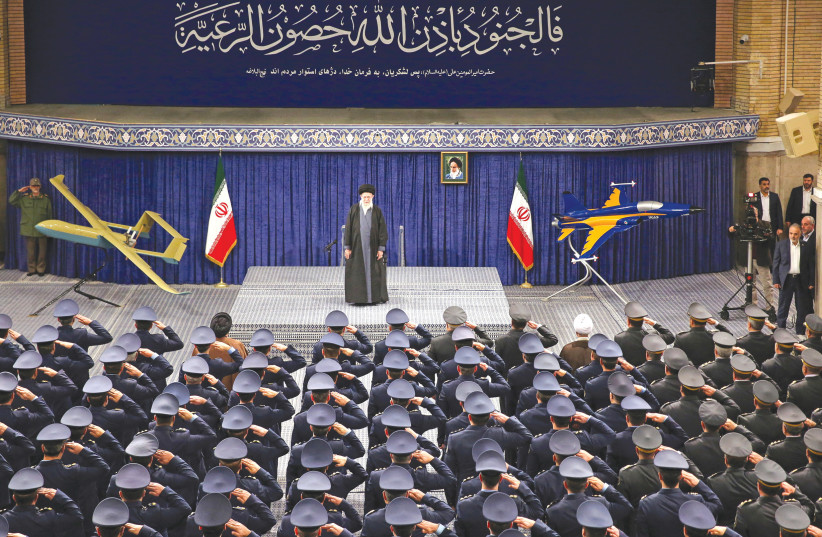This pivotal moment in Iran’s history was not just a turning point but also a clear departure from the democratic principles it purported to uphold. With only about 60% of the Iranian population eligible to vote, the regime claimed an overwhelming 99.8% in favor of establishing the Islamic Republic. This figure, glaringly implausible, highlighted not a triumph of democratic will but a manipulation of it, a stark testament to the lack of genuine choice within the political process.
The aftermath of this election saw Ruhollah Khomeini’s declaration of establishing God’s government on Earth – a bold claim that, in retrospect, stands in sharp contrast to the decades of authoritarian rule, corruption, and international condemnation that would follow.
The Islamic Republic, first under Khomeini and later Khamenei, has been characterized by its iron grip on power, widespread corruption, and a foreign policy aggressively promoting Islamic terrorism. This grim reality starkly contrasts with Khomeini’s vision, revealing a governance model that is arguably among the most corrupt, bloodthirsty, and despised “divine” governments on Earth.
The regime’s legacy over these 45 years is a narrative of disillusionment and betrayal. Theocratic rule replaced the promised democratic governance, with power concentrated in the hands of unelected clerics. Khomeini and Khamenei’s tenures have not reflected the people’s will but a deep-seated desire to maintain and consolidate power. The leadership has not only distanced itself from the populace through its actions but also through rhetoric, claiming divine sanction and infallibility, further alienating itself from the principles of accountability and representation.

The cost of the Islamic Republic's policies on society
The societal cost of this regime’s policies has been staggering. Iran, with its rich cultural heritage and significant natural resources, remains ensnared in economic difficulties and political isolation. The regime’s stubborn adherence to a hardline ideology has exacerbated these challenges, leaving the country increasingly isolated internationally. Moreover, the potential succession of Khamenei by his son signifies a continuation of dynastic rule, an ironic echo of the monarchy the Islamic Revolution sought to overthrow, further cementing the regime’s disconnect from the revolutionary ideals of equality and justice it once claimed to champion.
Yet, amid this backdrop of repression and disillusionment, the Iranian spirit of resistance has not waned. The populace’s repeated uprisings against the regime’s tyranny underscore a relentless pursuit of a more inclusive, democratic, and just society. These movements, though brutally suppressed, illuminate the undying hope for change and the resilience of a people yearning for a future where their voices are heard, and their rights respected.
As we stand 45 years from that fateful election, the journey ahead for Iran remains uncertain. The country is at a crossroads, facing the daunting task of reconciling its tumultuous past with the aspiration for a brighter, more democratic future.
The legacy of the Islamic Republic, marred by corruption, repression, and international isolation, serves as a stark reminder of the perils of unchecked power and the importance of genuine democratic governance. For Iran to forge a new path, it must embrace the principles of accountability, transparency, and the rule of law, ensuring that the dark chapters of its history do not define its destiny.
The past 45 years offer profound lessons for Iran and the world. The promise of the Islamic Republic has given way to disillusionment, underscoring the importance of genuine democratic processes and the accountability of leaders to their people.
Yet, these 45 years have not just been a testament to the failings of a regime but also a reflection of the indomitable will of the Iranian people. Their continued struggle for freedom, justice, and dignity against the odds is a powerful narrative of resilience and hope – a beacon for a nation on the cusp of change.
For Iran to emerge from this tumultuous chapter, it must confront the ghosts of its past and chart a new course toward a future that honors the aspirations of its people for dignity, freedom, and prosperity.
The writer is a counterterrorism analyst and Middle East studies researcher based in Washington, with a particular focus on Iran and ethnic conflicts in the region. His new book is The Black Shabbat, published in the US. You can follow him at erfanfard.com and on X @EQFARD.
